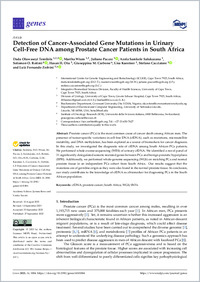Detection of cancer-associated gene mutations in urinary cell-free DNA among prostate cancer patients in South Africa
- Oluwaseyi Temilola, Dada International Centre for Genetic Engineering and Biotechnology (ICGEB), Cape Town, South Africa - Integrative Biomedical Sciences Division, Faculty of Health Sciences, University of Cape Town, South Africa
- Wium, Martha International Centre for Genetic Engineering and Biotechnology (ICGEB), Cape Town, South Africa
- Paccez, Juliano International Centre for Genetic Engineering and Biotechnology (ICGEB), Cape Town, South Africa
- Samkele Salukazana, Azola Division of Urology, University of Cape Town, Groote Schuur Hospital, South Africa
- Rotimi, Solomon O. Biochemistry Department, Covenant University, Ota, Nigeria
- Otu, Hasan H. Department of Electrical and Computer Engineering, University of Nebraska-Lincoln, USA
- Carbone, Giuseppina M. ORCID Institute of Oncology Research (IOR), Faculty of Biomedical Sciences, Università della Svizzera italiana, Switzerland
- Kaestner, Lisa Division of Urology, University of Cape Town, Groote Schuur Hospital, South Africa
- Cacciatore, Stefano International Centre for Genetic Engineering and Biotechnology (ICGEB), Cape Town, South Africa
- Zerbini, Luiz Fernando International Centre for Genetic Engineering and Biotechnology (ICGEB), Cape Town, South Africa
- 2023
Published in:
- Genes. - 2023, vol. 14, no. 10, p. 1884
English
Prostate cancer (PCa) is the most common cause of cancer death among African men. The presence of tumor-specific variations in cell-free DNA (cfDNA), such as mutations, microsatellite instability, and DNA methylation, has been explored as a source of biomarkers for cancer diagnosis. In this study, we investigated the diagnostic role of cfDNA among South African PCa patients. We performed whole exome sequencing (WES) of urinary cfDNA. We identified a novel panel of 31 significantly deregulated somatic mutated genes between PCa and benign prostatic hyperplasia (BPH). Additionally, we performed whole-genome sequencing (WGS) on matching PCa and normal prostate tissue in an independent PCa cohort from South Africa. Our results suggest that the mutations are of germline origin as they were also found in the normal prostate tissue. In conclusion, our study contributes to the knowledge of cfDNA as a biomarker for diagnosing PCa in the South African population.
- Collections
- Language
-
- English
- Classification
- Medicine
- License
- Open access status
- gold
- Identifiers
-
- DOI 10.3390/genes14101884
- ARK ark:/12658/srd1331850
- Persistent URL
- https://n2t.net/ark:/12658/srd1331850
Statistics
Document views: 60
File downloads:
- Carbone_2023_MDPI_Genes_Detection of Cancer-Associated Gene: 35
